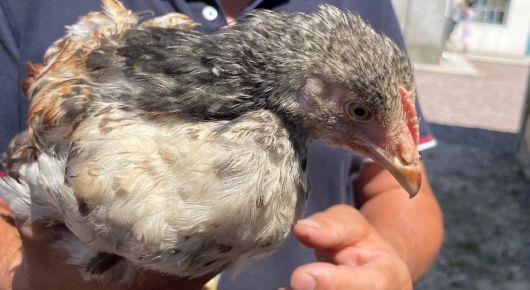Development of poultry farming helps families and schools in Kyrgyzstan

In Kyrgyzstan, where most of the population lives in rural areas, small-scale agriculture and animal husbandry is the main source of food and income.
To this end, the Food and Agriculture Organization of the United Nations (FAO), together with the Kyrgyz Ministry of Agriculture, Water Resources and Regional Development, and the Ministry of Education and Science has been supporting the development of family poultry farming in rural and suburban areas of the country.
Not only does this develop poultry farming as an industry in seven selected regions, but also targets vulnerable households and remote schools, supporting them to diversify their diet and thereby improve their health, as well as helping their financial situation and quality of life.
In total, to date, 84 vulnerable households and seven remote schools benefitted, which received necessary equipment to launch their future activities, including chickens (hens) aged from 1.5 months, animal feed with vitamin and mineral additives, fencing materials for the poultry house, and feeders-drinkers.
Poultry in households
To date, farmers have been trained in poultry breeding, keeping, and feeding, and building a chicken coop, while also getting acquainted with good hygiene practices and poultry health protection. In addition to this, they have learned about business planning and product promotion to local and other markets. An FAO expert also provides private consultations on all issues of interest.
Furthermore, the poultry distributed is fully vaccinated to protect them from devastating diseases, such as the New Castle disease. Each household received 30 chickens from dual-purpose breeds that are oriented toward both egg and meat production, and feed with additives in the amount of 100 kg for the first time.
The development of the poultry farming sector provides an important source of protein that has not only a positive impact on the nutrition quality of children and adults and helps reduce malnutrition and stunting in the country, but also addresses existing socio-gender issues through involving women and youth and expanding their rights and opportunities.
While currently women often have difficulties in accessing resources, land, employment, and so on, poultry farming can become a flagship industry in which both women and men can develop equally. Another major advantage of this sector is that family poultry farming requires a small initial investment and brings a quick and high-quality return providing opportunities for poverty reduction in rural and semi-urban Kyrgyzstan.
School poultry farming
Each of the seven rural schools received 120 chickens and 600 kg of feed with additives, and, just as the farmer households, all necessary materials and training.
Poultry farming is also a tool for raising awareness among school students and their parents on nutrition and healthy eating and orient children's preferences for healthy foods. This also aids in developing their entrepreneurial skills and involving them in the practice of implementing sustainable and climate-optimized methods of managing natural resources.
The development of poultry farming in schools is a primary addition to the current hot meal programme in schools, making children's food diverse and enriched with high-quality protein, which strengthens health and physical condition in the early years of development.
30 August 2021, Bishkek, Kyrgyzstan
